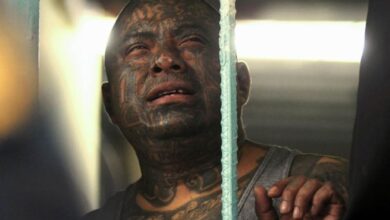Guatemalan Filmmakers Bring Local Stories to the Big Screen

The third edition of ‘Cortos Finos para tu Cabeza,’ a showcase of short films and documentaries, is set to premiere in Guatemala. This event highlights the rise of Guatemala’s film industry, showcasing diverse stories and voices from both seasoned filmmakers and emerging talent.
Guatemala’s burgeoning film scene will take center stage this Friday with the premiere of the third edition of Cortos Finos para tu Cabeza, a unique collection of twelve short films and documentaries highlighting the diversity of the country’s growing audiovisual landscape. This film showcase, which translates to “Fine Cuts for Your Head,” is a playful nod to the barbershop signs commonly seen in Guatemala City’s historic center, and it reflects the organizers’ goal of bringing style and substance to the big screen.
The initiative began in 2016 as a grassroots effort by filmmaker Ameno Córdova and fellow filmmaker Camila Urrutia, who were determined to provide a platform for Guatemalan short films. “We started this because our short films were never selected for festivals,” Córdova explains. “We needed a space where our work could be seen.”
The result was Cortos Finos para tu Cabeza, which, in its third edition, will take place at the Capitol Cinemas in Guatemala City’s historic district on Friday, September 13. This year’s lineup includes seven documentaries and five fiction shorts, offering many stories, themes, and perspectives. The event has become a vital space for Guatemala’s filmmakers to show their work while allowing local audiences to see themselves reflected on the big screen.
Honoring the Past, Reflecting the Present
One of the central themes of this year’s showcase is preserving memory and history through film. In a special section called Rescatar del Olvido (Rescuing from Oblivion), the festival will screen audiovisual works by Eduardo Spiegler, a filmmaker who tragically lost his life in Nicaragua in 2018 while documenting protests. By showcasing Spiegler’s work, the festival aims to honor his contributions to the world of documentary filmmaking and remind audiences of the power of film to bear witness to history.
Among the other notable documentaries is Sacratávica, a collaboration between Córdova and Pepe Orozco that pays tribute to the music of Guatemalan composer Joaquín Orellana. The film focuses on Orellana’s work during the 1970s, which was inspired by the massacres that occurred during Guatemala’s internal armed conflict (1960-1996). The film preserves a crucial cultural legacy and reflects the country’s painful history.
On the fiction side, A veces me gusta creer que soy el aire (Sometimes I Like to Believe I’m the Air) by director Luisa Urbina tells the powerful stories of women who have experienced violence, capturing their struggles and resilience. Including such a film underscores the festival’s commitment to addressing social issues and providing a platform for underrepresented voices.
One of the festival’s most exciting aspects is its embrace of young filmmakers. Natalia Sánchez, an 18-year-old filmmaker, will present her short film Cirios, bringing a fresh perspective to the showcase. Including filmmakers like Sánchez highlights the festival’s role in nurturing the next generation of Guatemalan storytellers.
Challenges in the Film Industry
While Cortos Finos para tu Cabeza has become a much-anticipated event for Guatemala’s film community, putting together such a showcase has not been easy. According to Córdova, organizing a film festival in Guatemala presents logistical and financial challenges. “Renting a theater is expensive, and sound production costs are high. It’s not easy to create a space to showcase local films,” he admits.
Despite these challenges, the festival has thrived thanks to the support of various community organizations, small businesses, and individual sponsors. Local restaurants, bookstores, and social organizations have all contributed to making the event possible. The organizers also ensure that everyone involved in the production is compensated for their work, adding another layer of complexity to the project and reinforcing the importance of valuing creative labor in the growing Guatemalan film industry.
Independent filmmakers’ financial difficulties in Guatemala are emblematic of the broader challenges within the Latin American film industry. Many countries in the region lack the institutional support that filmmakers in other parts of the world might take for granted. Government funding for the arts is limited, and filmmakers often rely on international grants or private donations to fund their projects. Despite these hurdles, the rise of events like Cortos Finos para tu Cabeza indicates a strong and growing appetite for local cinema in Guatemala and across Latin America.
A Growing Industry with Global Aspirations
Guatemala’s film industry may still be in its early stages, but it shows signs of significant growth. According to Córdova, more and more Guatemalans are pursuing careers in film, and the level of professionalism in the industry is steadily rising. “The world of cinema in Guatemala is rising,” he says. “Many people are becoming professionals in this field, and the country needs to recognize that this is a valuable industry worth supporting.”
The rise of Guatemalan cinema is part of a broader trend across Latin America, where countries like Mexico, Argentina, and Brazil have long-established film industries. In recent years, however, smaller countries like Guatemala have started to make their mark on the international film scene. Festivals such as the Panama International Film Festival and the Costa Rica International Film Festival increasingly showcase Central American films, providing a platform for new voices from the region.
One key driver of this growth has been the increased accessibility of digital filmmaking tools. In the past, producing a film required expensive equipment and access to professional studios. However, filmmakers can shoot, edit, and distribute their work today using affordable digital cameras and software. This democratization of filmmaking has opened the door for a new generation of filmmakers from countries like Guatemala to tell their stories.
The Importance of Local Audiences
While international recognition is essential, Córdova emphasizes that the growth of Guatemala’s film industry ultimately depends on building a strong local audience. “This type of showcase is meant to help Guatemalans get used to seeing themselves on screen,” he explains. “Without an audience, the industry can’t grow.”
In recent years, there has been a push across Latin America to cultivate domestic film industries that reflect local cultures and experiences. Filmmakers in countries like Colombia, Chile, and Peru have increasingly focused on telling stories that resonate with their communities rather than catering to international markets. This shift has led to a resurgence of interest in local cinema, with more and more Latin Americans attending film festivals and screenings in their home countries.
Guatemala’s film industry is no exception. As more Guatemalans see their own stories reflected on screen, the hope is that a more robust film culture will take root in the country. This, in turn, could lead to more significant investment in the industry, both from the government and from private sector companies.
For now, Cortos Finos para tu Cabeza reminds us of Guatemalan cinema’s potential. With a mix of seasoned filmmakers and young talent, the festival is helping to pave the way for the country’s future cinema. As the industry continues to grow, the hope is that Guatemala will become a hub for creative storytelling within the region and on the global stage.
A Platform for Growth and Reflection
Cortos Finos para tu Cabeza is more than just a film festival—it is a platform for Guatemalan filmmakers to showcase their work, address social issues, and connect with local audiences. Despite the challenges of producing and distributing films in Guatemala, the event is a testament to the resilience and creativity of the country’s filmmakers.
Also read: Gael García Bernal and Diego Luna’s Powerful Reunion in Mexico
As the Guatemalan film industry continues to grow, festivals like this one will play a crucial role in shaping the future of cinema in the country. By providing a space for filmmakers to tell their stories and audiences to see themselves reflected on screen, Cortos Finos para tu Cabeza is helping to ensure that Guatemalan cinema has a bright future.




